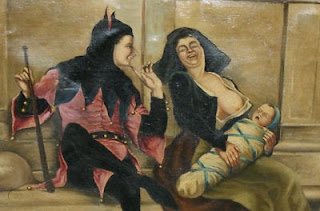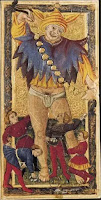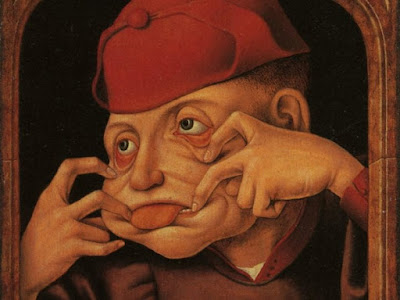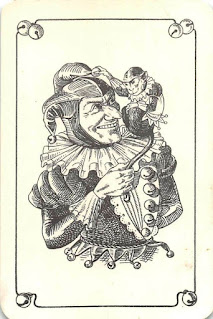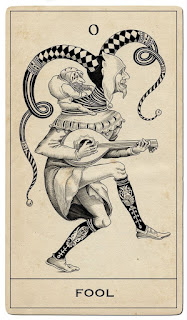Son of night and darkness, fraternal twin of misery, Momus is the Greek god of blame, mockery, and satire. Momus was THE fool of THE hill, that is to say the comic thorn in the sides of the gods and goddesses of Mount Olympus. Momus first proved Athena goddess of wisdom wasn't half of clever as she thought she was. He proceeded to praise the perfection of Aphrodite...less her creaky sandals and the fact that she talked too much. It was all good for a laugh so long as you weren't the butt of his mockery. However, nobody laughed when Momus openly ridicules the mighty Zeus for his many infidelities. Wrath incurred, Zeus tosses Momus from heaven, according to some accounts binding him to a rock for castration by the offended goddesses.
During the Medieval period, Momus became the model for the court jester. Outfitted in absurd regalia, the jester served a vital role as the conscience and moral mirror of the King. No matter the circumstance, one could count on the jester to tell the King the truth. When the censure of the jester was silenced by the censorship of the Sovereign you knew that the kingdom had succumb to tyranny. In a similar fashion, Renaissance and later writers such as Leon Battista Alberti and Thomas Wood employed the voice of Momus to express controversial criticisms of the church and secular authorities of their day. Below for your reading pleasure are a few aphorisms attributed to Momus, the Greek god of satire.
“Zoom not doom. Isolation is salvation. Remember, virtual life is the virtuous life! - Momus 2.0
“The imminent threat of the stick makes the alternative of the carrot all the more alluring.” - What’s up Momus?
"Fools to my left prattle on about equality while jokers to my right clamour incessantly for freedom; I'd be hard pressed to think of two things more confessedly absurd, more contrary to the laws of nature than Equality and Freedom!" - Momus has an headache
“No need for despair...there’s a stick for every hole.” - Momus Snookers
“Sing it with me now:
‘D’ means: di-ver-si-ty
Long as: you-look-like-me
‘I’ is for: in-clu-sion
Pick and choose: who-you-shun
‘E’ gives us: e-qui-ty
Get what’s mine: i’ll-be-free
Together we can
DIE, DIE, DIE
Lets all just
DIE, DIE, DIE...”
The ballad of Momus
“Fear is the power before which every knee must bend. She has compelled you to believe anyone and made you accept anything.” - Momus says the joke’s on you
"Is race 'real'? If by real you mean a widely held, persistent, self-propagating, social construct claiming that the most significant and meaningful differences among human beings must be superficial physiological ones...well in that case, sure why not. Race must be just as real as any other pathological delusion you suffer from." - Momus in denial
“Never repress your feelings. The case could be made that suppressing one’s actions and speech is part of being a social creature. And in practical terms we obviously can’t choke to death absolutely everyone that irritates us. That’s alright though, we have imagination for that!” - Momus gets creative
“Anyone who thinks marriage is ‘just a piece of paper’ has obviously overlooked the fine print.” - Momus gets hitched
“What remedy can there be for the blunders of technology but further technology?” - Momus makes progress
“Darling, I’m not leaving because I don’t care. It’s just that I haven’t the stomach to presence an unfolding catastrophe about which I can do nothing.” - It’s not you, it’s Momus
“It requires the special idiocy of a peasant to consign one’s own inheritance to the flames.” - Momus goes up in smoke
“Accord your fellowman all the respect due a feral beast. The ever-present threat of immediate, extreme violence lies at the very heart of all peaceful, civilised human relations.” - No pacifying Momus
“From the cradle to the grave, human dignity amounts to never providing for a person what they can provide for themself.” - hands off Momus
“Note to victims: if you insist upon walking through life oblivious you will be complicit in whatever befalls you. No matter what story you’ve been told, you are primarily responsible for yourself.” - Momus won’t suffer himself gladly
"Quick poll: how many agree that radio-frequency identification
subcutaneous microchip implants ought to be mandatory with enforced vaccination? (this is a safe space to freely express your support for the only morally correct view)" - Momus at warp speed
"What is a 'nice person' but a finely crafted masque to amplify the sound of one's own ignorance?" - Momus' reflection in a mirror darkly
"History amounts to little more than a pack of lies agreed upon...wouldn't you agree?" - Momus assimilates
"There's no evidence you're a good person, that you're even much 'civilised. No, not really. What you are my furry little friend is warm and well fed. - fat and happy Momus
"It's not really reason that separates us from other animals, it's empathy. Empathy is the motive force behind our greatest virtues as well as our most heinous atrocities. Empathy is the basis of praise or blame, mercy or condemnation." - Momus' moment of lucidity
"In the end, if you look closely enough at this thing men call 'power', you'd realise that it's really nothing more than an intolerable servitude that one would do best to avoid." - Momus wants out
“Man
is a moral animal, a judgemental machine. The man who claims freedom
from discrimination is either wholly defective or a complete imbecile,
but more likely a liar.” - Momus’ pickled as a herring
"Unless you're absolutely willing to accept every belief and any behaviour, your calls for inclusivity amount to figuring out who you're going to exclude and why." - Momus feels rejected
"When I was a child I had a vision for world unity. I thought how wonderful it will be when everyone has electricity, everyone has a car, everyone speaks English, everyone is equal...because they're just like me! I think I might be forgiven for that; after all, it was the infantile thinking of an undeveloped, immature child." - Grow up Momus
"The thing one must admire most about the historic self-preservation movement is their desire to freeze in amber the best remains of a dwindling supply of anything beautiful in this world because they know in their heart of hearts we can never, ever, ever have it again." - Less is Momus
"Cognition
arrests transmission. If you want your idea to spread and receive wide
acceptance make sure that it's devoid of intellectual content." - Momus
goes bacterial
"All that you pursued, acquired, and gave up...how much of it meant anything to you beyond what you hoped might impress some passerby? Were disinterest, envy and resentment the rewards you were expecting?" - Momus makes an impression
"When
the entire world in all its strivings is found to be in complete
tumult, visited by plague after calamity, with the hand of each man at
his brother's throat...well, my advice is to find a quiet spot, lie
back, yawn, and dream about naked thighs." - Momus tickled pink
"Don't let them tell you any different, there is justice and equality in the world. It's true, we may never achieve what we'd hoped; however, in the end we all get what's coming." - The sun sets on Momus
“My good doctor has placed me on light duty, my being advised to lift nothing more than a fair maiden’s petticoat.” - Pound me too Momus
"Now darling, do remember that without sin there is simply no basis for forgiveness." - By the grace of Momus
“It’s bad enough being hungry. So sense in being hungry and tired.” - Momus is begging for it
"There are two narratives running in parallel regarding the relationship of men towards women. One is that throughout history boys have loved their mothers, fathers their daughters, and husbands their wives. Then there is the true one that men only wish to dominate and systematically oppress when they've had their fill of raping." - Time's up Momus
“The first lie is the worst lie. It’s the sweet one we whisper to ourselves.” - Busted Momus
“Thieves, murderers, rapists...you and I come from a long line of bastards. They’re the ones who survived!” - Momus takes stock
“My thoughts on the nature vs nurture debate are as follows: no matter what you tell him or what you do, your little boy is going to grab handfuls of sand and throw them at the ocean.” - The Oracle of Momus
"You might want to quell your excitement for what they're giving you just long enough to consider, if but for a moment, what you're about to lose forever." - Think Momus Think
"Just remember, you are the victim. Mostly of your insatiable appetites, unchecked lust, and impulsive desires. But definitely the victim." - Momus was dealt a bad hand
"Change the world...so you don't have to change yourself, ever." - Momus' protest
"I'm very good with my hands but I'm exceptional with my tongue...or so I've been told." - Momus plays along
"Folks don't respect me for my mind, they only want me for my body." - Momus' naked truth
"If
you're master of your own body, they'll be justified in suspecting you
may've clue of what to do with theirs." - Momus is a dancing fool
"Depression, anxiety, grief are not pathologies to be fixed, rather fundamental aspects of one's humanity; appropriate responses to the tragic nature of our existence." - The Tears of Momus
“A moment on the lips, a lifetime on the hips...if one should be so lucky.” - Momus loves Mischief
"No guilt, no shame, no remorse. I know who and what I am and I just love what I see." - Momus reflects
"The trouble with craftsmen, farmers and all the other little people is that they're too preoccupied building up the world to help burn it down with the best of us." - Momus is Revolting
"I'm
very understanding of insecure people. What I primarily understand is
that I don't want them anywhere near me." - Antisocialist Momus
"Who you really are and why you do what you do are far more complicated than you could possibly even begin to understand." - Momus strings us along
“The most unhelpful thing I ever told a friend was that there was nothing wrong with her.” - Over a barrel with Momus
"It's not just a mistake, rather a violation of his dignity, liberty, and person to care for an individual more than he’s willing to care for himself." - Momus wants for no one
“Who wouldn’t play the madman, when the king himself is insane?” - In Momus’ Shoes
“The distinction between what is natural and artificial is a simple one. Whereas everything man makes breaks down, the growth of nature, even when apparently chaotic, is but a transitory stage towards higher levels of holistic complexity.” - Momus’ Razor
"Now you see, what they neglect to mention is that those who do trouble themselves to learn from history are damned to bollocks everything up in an entirely novel way." - Momus 101
"A wise man was once purported to have said: 'The heaviest load we carry are the thoughts in our heads.' I find that to be an highly charitable statement." - Momus being an ass
“The amazing thing about people is that, as individuals, we’re almost all wise and aware of what is right; but when we form ourselves into a group we forget anything that doesn’t suit our own pleasure and don’t care whether what we undertake is pernicious and base so long as we can have our way.” - Momus’ Ship of Fools
“It
is an hopeful yet typically erroneous belief that fear and distrust is
based solely on ignorance of the ‘other’. The disturbing reality is that
our most intractable hatreds are rooted in a deep familiarity.” - to
know Momus
“You
know, contrary to popular belief there are really only two races. Care
to guess what they are? I’ll give ya an hint: one is more vital than
the other and begins with a ‘W’. - Momus is dynamite
"I
propose that those who are wholly against the idea of servants have
never truly lived with nor experienced the benefits of servitude." -
Momus at your service
“As the mysteries of nature have been sucessively unmasked, the old myths losing hold on the imagination, the superstitious terrors of the nite dissipating, in their place appears the nausea and unease of modernity, the plethora of systems we can’t hope to understand, hurtling us forward with an uncontollable inertia towards an yawning abyss. Our foolish ancestors might well would ask us if the stories we tell ourselves today to situate ourselves in this maelstrom, are these any less fanciful? - Momus in the Tempest
“What
is the progress of civilisation but an unfettered, unrelenting pogrom
of improvement visited upon the unfortunate whether they want it or not?
- Momus knows best
“The
city occupies a special, unique place in human culture. Having
established the best way of life, it is the only form of societal
organisation that is completely intolerant of other forms of existence.”
- Momus or else
“When you beat a fool, you don’t make a wise man of him. All you’ve to show for your troubles is a sore hand and a beaten fool.” - Momus’ voice of experience
"Beware of charismatic leaders. The world needs healing, not saving." - Momus' out of tune
“The reason you want to be better is the reason why you aren’t.” - Momus knows what’s Watts’
“Need I remind you that “stupid” is not a protected classification. It’s open season on all you dumbass mother...” - Momus’ locked and loaded
“When they say ‘violence begets violence’...well, I’d suggest they’re not doing it right.” - Lights out Momus
"If someone tells you 'we're all liars', might you not be a wee bit gullible to take them at their word?" - honestly Momus
"Be brutal, just tell me. I can handle this. I really need to know. On a scale of 9 to 10 with 9.5 being the highest...honestly, how am I doing?" - The fragility of Momus
"A wise mystic once told me, 'cultivate your own garden before spreading seeds abroad.' So... There is no righteousness like self-righteousness
There is no righteousness like self-righteousness
There is no righteousness like self-righteousness"
- Momus' Mantra
“If your inner compulsion is to constantly signal how woke you are, how awakened can you truly be?” - Momus needs a nap
"Those who disparage and discount the Postmodernist
philosophies in their entirety, fail to acknowledge that there are specks of gold in and amongst the mountain range of sludge.
One must kiss many, many frogs before finding one's prince." - Momus warts and all
"Before you depart upon a journey of revenge, dig two graves. Well, at
least two, perhaps three, maybe even as many as seven or eight depending
how successful you anticipate being." - Momus gets his hands dirty
"The capacity for empathy manifest by human beings far exceeds that of
any other creature. This no doubt explains our penchant for torture
e.g." - Momus knows how you feel
“Everything else is a distraction. The looming economic apocalypse is
identical with the approaching environmental collapse. In the end, there
is no wealth but life.” - broke and broken Momus
"And to think that a few stray rays of far flung suns that've long burnt
cold have managed to guide us through the deep and shape the course of
human history." - the sign of Momus
"Whereas you console yourself that nothing you do really matters, the
more daunting prospect remains ever present, gnawing away inside you
that everything you do in fact matters oh so very much." - no escaping
Momus
"The difficulty with maintaining the Revolution is that we
seldom can
find the stomach to do what is necessary to our own children and
grandchildren that which we are so proudly, virtuously prepared to carry
out upon our neighbours, brothers, sisters, and parents." - Momusism
"As we take hold each one the hand of his brother in a spirit of
distrust and animosity, walking together towards this one, certain,
predetermined future, I reflect on this great and noble experiment: the
Freedom of Limited Choice." - Momus registers his compliance
“Force is seldom necessary when you voluntarily accept the legitimacy of
an authority. You will internalise their values, justify impositions
you can’t hope to understand and gladly surrender your very body and
that of your children to their will. There is no vaccine for scientific
propaganda.” - Needling Momus
“Well of course I objectify you my dear. You’re soft, warm, and taste
delicious. I don’t exactly make love to an idea.” - Bon apetit Momus
 “So at what point does a person cease to be the victim, so as to become the perpetrator?” - Momus’
“So at what point does a person cease to be the victim, so as to become the perpetrator?” - Momus’
everlasting childhood
“Clean energies will never solve Dirty uses.” - Mean Green Momus
"We've determined that it takes 13 years to deconstruct a human being,
breaking all significant ties of kinship and natural inclination. It
requires an additional 4 to 9 years of capital investment to structure
the resultant product for the specific functional requirements of the
system." - Momus on the value of a good education
"We used to castigate a child as unruly who could not sit down, shut up,
and internalise abstract indoctrination for decades. Now parents
understand this inconvenient condition of their children to be a disease
that must be treated by experts with narcotics." - Momus takes his
medicine
"One of the oft unheralded benefits of initiation into a cult is
intimate exposure to the inner workings of unrelenting psychological
manipulation. Another is the revelation that ’normal’ society is
organised along parallel lines." - Momus' eyes wide shut
“To properly prepare oneself to argue with a fool, one should first pass
long hours practising before a mirror.” - Momus’ wisdom is Debatable
“Never think that your willing participation doesn’t serve a purpose.
Democracy is the most effective form of governance in establishing a
sense of shared culpability and communal guilt.” - Vote for Momus
"This mate of mine was complaining that you lasses tend to be
irrational, oversensitive, and lack ambition. He could've saved us both
some time by saying that you lot are just like us lads." - Momus on thin
ice
“Whereas force demands the expenditure of physical or economic advantage
to overcome another’s will, domination utilises psychological
manipulation to bend another’s will to reinforce that advantage.” – May
the force be with Momus
“To ‘speak truth to power’ is a metaphor. The only thing power respects is power.” – Merry old Momus is getting hoarse
"Original thinking is in fact exceedingly rare. It usually happens by
accident when attempting to judiciousnessly plaigarise from the previous
work of others." - Copy that Momus
“Me brutha got a tip from a gypsy: She say you hidin' from reality
In your world of Hipocrisy”
"A version of the following question has been making the rounds:
'What if humans are the viruses destroying the planet and plagues are the earth's vaccine?'
Well isn't that marvelous. How courageous, self-sacrificing, and
morally upright it must be to stand with mother earth! Although
personally, I'd be hard pressed to come up with a more dehumanisng,
genocidal thought. After all, we all know there's only one thing to be
done with a virus..." - No Immunity to Momus
“A society might well be judged by the treatment of its most vulnerable
members, those who can’t defend themselves, having no legal standing;
take chickens and the unborn for instance.” - Momus says their body,
your choice
“The difficulty with repression of one’s feelings is that self-loathing
is not
sustainable. Sooner or later one will project one’s hatred toward
those who illicit those feelings.” - The Isle of Momus
“We tend to condemn the fellow who finds attractive every girl he meets
when we ought take pity on him for his faculty of repulsion not
functioning correctly.” - Momus’ lost lust
"You heard it was said, ‘Therefore all things whatsoever ye would that men should do to you: do ye even so to them.’ Whereas I say: 'As far as humanly possible leave people the goddamn hell alone.'"
- Saint Momus' Platinum Rule
"There used to exist a diagnosis for a person who persists in a false,
fixed belief of identification with something that they are demonstrably
not. Delusional psychosis if memory serves..." - Momus off his meds
"Just remember, it's the cock's mouth that finds the cock in the pot." - Mum as Momus
"Well to keep in mind, not everything that comes from heaven is a blessing." - Momus would know
"It's becoming difficult to distinguish between the terrors of the darkness and
my waking nightmares." - Haunted Momus
"The presence of my absence is a world that questions nothing of real importance." - Momus' Surreality
"We've rescued ourselves from the horrors of the 20th century where one
man could change everything to be delivered into a world where no one
can possibly change anything." - the Impotence of Momus
"To be honest I don't care about you. How could I when I don't know you personally?
At most I'm attached to an idea of you I've formed in my head which is
essentially to say I'm self-interested." - Momus lays his cards on the
table
"To allow someone to change your mind is by definition to succumb to a
coercive power, a violation of your psyche, a penetration into your very
thoughts." - Momus isn't up for Debate
"Happiness is a dismal pursuit, one at odds with the whole constitution
of the universe. Barely perceptible over the long run, it only comes
into sharp focus by intense contrast with a profound misery. You
shouldn't wish it upon your worst enemy let alone for your children." -
Momus' blessed advice
“Man is a natural born killer. I’ve yet to meet an happy vegan or a miserable hunter.” - a medium rare thought from Momus
“If you don’t want her all the time, if you don’t wish you could
dissolve into her, well then whatever it is you think you’re feeling,
it’s not love.” - Thirsty Momus
“I’m all for the abolition of the death penalty. My only insistence is that the murderers go first.” - Unbecoming Momus
“Sharing the blessings of civilisation with the unfortunate, notably
technological advancement and childhood education, have been the most
culturally destructive activities in human history.” - Momus’ good
intentions
“I don’t care what they say, it’s entirey possible to unite a society on
the basis of peace and love. I mean, so long as there are enough folks
left over to serve as the object of its collective aggression.” -
Discontented Momus
“It’s not the Good as such that the Devil opposes. Rather it’s Life he’s
against; that unquantifiable, unbridled, ‘of itself so’ aspect of
existence, beyond any possibility of control.” - what’s gotten into
Momus?
“I think the folks so adamant against magical thinking and those
responsible for the disenchantment of the world are closely related if
not one and the same person.” - Hocus Pocus Momus
“Identity groups whose leaders can be manipulated serve an important
function to civilisation. With religion emasculated, it provides the
commoners purpose in life and an outlet for their repressed aggression
that having every material need met thru unbridled consumption has been
unable to satiate.” - Momus’ New Credulity
“People either have the capacity for good and bad or else they come into
the world wholly evil. Unfortunately those are the only two options my
little friend.” - Momus swaps black dog for monkey
“You cannot hide from the things you’ve done nor even your ill intent.
When the authorities aren’t watching you directly, they’ve established a
garrison in your mind like an occupied territory, ready to mete out
punishment.” – Momus is watching...always
“I don’t have a drinking problem; I absolutely love to drink. What I
suffer from is a metabolism of alcohol deficiency.” – Momus is his own
reward
“What is a craftsman but a workman who is resigned to the fact that,
whatever else happens, his work shall be deemed kitsch, pastiche,
anachronistic, out of touch with the present Zeitgeist?” - Modernist
Momus
"An Enlightened One once said, 'life is suffering.' It could very well
be that those preoccupied with alleviating mental anguish and
eliminating physical pain in the world are in reality manifesting their
fixation with death." - RIP Momus
“Each man is his own universe and like the universe is in a constant state of change and motion. Such dynamic particularity presents an inconvenient obstacle to the stereotyping necessary to efficiently sort ‘those people’ into their respective identity group.” - Momus’ frustration
“So for how many generations must a people stay put in a given place
before they’re considered indigenous, that it can rightly be considered
their home?” - Momus on the move
“An equally difficult question: After how many generations of absence do
a people cease to be considered indigenous, that they lose the right to
their ancestral home?” - Momus living rough
"The biological risk to your well-being seems real enough. However, as I
witness the greatest transfer of wealth, the unprecedented restriction
of travel, and the vast consolidation of corporate and governmental
authority, I just wonder if a bug constitutes the threat you should be
most obsessing over." - Momus ain't whistling Dixie
"Remember children, a handful of folks making the decision on behalf of
the rest of us to destroy property we hold in common is the very
foundation of a peaceful protest. It may not be precisely democratic but
no one can deny that it's popular. In fact, I'd say it's all the rage."
- Light 'em up Momus
"As I observe all those who proclaim peace, love, diversity, inclusion,
equality begin to devolve and surrender themselves to their basest
instincts, I feel a sense of connection if not outright camaraderie.
They're not that different, in fact they're just like the rest of us." -
The brotherhood of Momus
"My feelings on late term abortion are as follows: a mother's rights
should pass to the wife who will retain the right to terminate until the
163rd trimester." - Momus better watch himself
“Imagine a world where there’s no religion to divide us, where all
humanity unites in common cause, where inequalities are but a fading
memory, where the colour of your skin means less than your commitment to
your brother...where those who don’t share this blessed vision are
interned in camps far, far away.” - Momus’ been there, done that
Who is Momus? "One wise, bloody kraut
almost sussed me out
I’m known by many names, you would be wise to shun:
‘I am the spirit of perpetual negation;
And rightly so, for all things that exist
Deserve to perish, and would not be missed’”
- Momus, plasterer of lies
“But of course I understand the experience of being a woman. I’m half
woman after all, my mother being a woman.” - The fluidity of Momus
"I'm curious how many generations it will take of human beings living in
material comfort and security before they entirely lose any and all
instinctual capacity for survival. If I were pressed to hazard a guess I
would say three sounds like a good number." - Fat Cat Momus
"The very first, most critical, and constantly reinforced lesson of a
proper education convinces the child that the very process of learning
anything is an institutional one wielded by experts in a position of
authority that is based upon accreditation and certification.This lesson
may take up to two decades to sink in." - Stay in School Momus
"Class consciousness is hardwired into our society from early childhood
through passivity and dependence upon bureaucratic schemes that dispense
knowledge as a commodity, picking and choosing who will progress thru
the system in what are literally called 'Classrooms.'" Momus don't need
no thought control
"Justice has evolved from the naked interest of the stronger into the
blind, deaf, and dumb judgement of our peers." - Momus' Court of Fools
“If you are thoroughly convinced that you are being kept down...well, in that case you most certainly are.” - Systemic Momus
“Revolutionary urges are today subsumed and repackaged as
consumable
commodities in a matter of days if not hours by near omniscient,
practically immortal institutions. At this point entropy is mankind’s
only chance; global systems of production and control collapsing under
their own dysfunction because their complexity surpasses our ability to
understand and thus patch them up. This alone holds the promise of one
day painfully returning a remnant of our children to a simpler life of
just muddling through bare existence.” - Momus comes into his
inheritance
“As man has lost sight of the end of his life, the unguided and
ever-amplifying means of his continued existence have spiraled out of
control.” - what’s the point Momus?
"A blessing of submitting oneself to a discipline, mastering a skill
with one's body, is that it liberates one to think freely whilst
working. Quite often the very exercise of the skill itself constitutes
an act of meditation." - Namaste Momus
"Beware of the man with the plan, promising to elevate your happiness by
divvying up your existence into discrete, rational sections. Be the
architect of your own bloody life for heaven's sake!" - Momus by Design
"The capacity of calibrated technologies to measure, calculate, and
refine have long since eclipsed human sensory abilities. Nevertheless,
I've developed no sympathy with the precision of the machine, pitifully
remaining quite content with what is perfectly human." - i'll go
rhythmic Momus
"As regards the populist politicians, I don't assign them much credit
nor do I cast upon them all blame. They are but a hazy reflection of the
system that brought them into being. Also a sacrificial lamb for the
mob when they can no longer summon the promised miracles." - Momus
thinks he's above it all
"Reflecting upon the development of my own thinking I can only hope that
it continues as a messy organism that matures rather than a beautiful
gemstone that has crystalised." - Scattered Momus
“I’m all for maintaining what is good for human flourishing and our
natural home. Yet I’m open to change when it’s no longer working,
especially for some. Conservative or Liberal ought not be predetermined,
hardened commitments rather responsive, adaptable behaviours in a
dynamic world of flux.” - Momus, what a fool believes
“Academic and professional certification has become the universal
criterion for all human knowledge and now serves as the primary form of
discrimination, unquestioned as entirely legitimate.” - Momus’ expert
assessment
"That someone who has dropped out of a university degree programme after
several years of schooling is considered even more of a failure than
someone who has simply completed high school suggests that the primary
purpose of institutional education may not be about learning at all." -
Momus is stumped
"Adjust your attitude towards gratitude: For the food you consume but cannot grow
For the shelter you inhabit but cannot build
For the clothes on your back that you don't want to even think about where that comes from
Your great-grandparents may've been allowed to provide all these things
for themselves but know that you never will." - Live, Laugh, Love Momus
Love is Love
An example of what the old philosophers would call a 'tautology': a
meaningless platitude, devoid of intellectual content, that contributes
absolutely nothing to human knowledge whatsoever."
- Bless your heart
Momus
"I regret to inform you darling that there will be no flattening of the curves." - This just in Momus
“What is a Classicist but one whose life and career is quite literally
in ruins?” - stultorum calami carbones moenia chartae Momus
“Yes sure there’ve been a few missteps, a couple even that threaten all
life on earth, but who seriously can resist the promises of progress?” -
Full steam ahead Momus
“Unlike justice, greed is never blind.” - 20/20 Momus
“The choice to guide your life by reason is itself not a rational one.” - Momus decides to decide
“We do not yet understand the social ramifications of the degradation of
psychological structures inherent to poetry, idiomatic language, myth,
and belief. All early indications point to collective insanity.” - Fade
to Momus
“You and I, our lives are an interwoven tapestry, and a beautiful one at that.” - For the love of Momus
“Someone called me out as a ‘prick’ yesterday. I felt compelled to point
out that for those of us who speak the English language the word is
‘prig’. A ‘prick’ is the twitch of the ears of your ass when called to
supper. This did not serve to diffuse the tension.” - What an ass Momus
“The thought that knowledge is somewhere out there, recorded in books,
the internet, or any medium outside of a body is a confused idea.
Knowledge arises within a living organism from interaction with its
environment.” - Momus you dunce
“We’re blessed to have a number of industries to cater to our
pathological dissatisfaction with our very being through mind altering
pharmaceuticals and carnal mutilation.” - Just Say Yes Momus
“If you’re confused about or can’t accept who and what you are, why on
earth would you expect that anyone else should?” - Momus in Denial
“Betrayal is the greatest sin against love, one that casts its victim
into the wilderness, leaving them to question their very capacity to
know what is real.” - Everything is dark Momus
“Caring about the world outside is a luxury afforded to those fortunate
enough not to be consumed by loneliness.” - A speck of Momus
“Do you imagine you and the universe are two? Hold your breath.” - Momus’ cold heart
“I’m quite distrustful of the type that seems perpetually happy. There’s something distinctively reptilian about them.” - Momus sheds his skin
“Contrary to popular belief, joining the peace corps, saving baby sea
turtles, or committing yourself to any other so-called ‘helpful’
activity directed against the unfortunate will not act as an antidote
for you not dealing with your personal shit.” - Misanthropic Momus
"It must be the rare mother, who upon looking into her newborn's eyes
for the first time does not believe in miracles" - the magic of Momus
“As man arose from his ignorant, superstitious past, the cold light of
reason cleansed the sense of wonder from his now enlightened mind. Yet
there is a new woke generation that will supplant even his remaining
dreams with ethical conviction and moral certitude.” - Momus making
progress
“Generally speaking I’d say men handle rejection rather well, far better
than we give them credit for. Makes sense, as we know they’ve vastly
more experience with it.” - Lady Momus
“What we’ve learned is that some people cannot be shamed. The task
before us is how to escalate mandatory universal enforcement.” - The
naked truth of Momus
“The mark of a good leader? Never settle for trust when you’ve the power to control.” - Momus off his leash
“We already have great leaders. What we presently lack is a better class
of sufficiently submissive followers. Hence the value of early
education. No youth must be left behind if they are to be the vanguard
of a well planned future (strings securely attached).” - Momus you
lunatic
"Living humbly off what the land provides, building your own
shelter
from simple tools combined with the human hand, evenings passed in song
and smoke...this has come back in vogue as an elitist fantasy existence
of a well-heeled bourgeoisie." - Trustafarian Momus
“How did they say ‘the lesser of two evils’ in German?” - time to pick Momus
"Yoga has matured into an industrially administered therapy for
accentuating happy thoughts to the exclusion of your negative energy,
thus shifting your guilt ridden consciousness into a steady state of
productive benefit to society." - Down and out dog Momus
“The real benefit of a two party system is that they can alternate
taking the lead in instilling fear in the population. The only downside
being the odd trampling of a citizen in the mad dash to abdicate one’s
civil liberties.” - Momus you can believe in
"It's reassuring to witness that despite respected positions, esteemed
educations, and protests to the contrary, with the slightest applied
pressure my friends and colleagues reveal themselves to be the beasts
they are." - Who let the dogs out Momus?
“All too often women are the victims of male aggression. Lamentably this
places us girls as the second most dangerous, violent, stone-cold
killers on the face of the planet.” - The Momus of the species
“People are not half as civilised as they pretend to be.” - Proceed with caution Momus
“Thank god children are small, weak, and inexperienced. They’re
pint-sized sociopaths, the lot of them.” - Momus should be seen and not
heard, preferably not seen either
"You entrap more flies with honey than vinegar. When looking to seduce
others with your ideology and melt away any opposition, pick a name that
no one can argue against without looking foolish. I mean come on, who
doesn't want to think of themselves as modern, social, communal e.g.?" -
Momus' Honeypot
“Both the dismissal of regressively looking back to the primitive
traditions of our forefathers as well as justification for all the
horrors visited upon us by modernity have oft been expressed in two
simple words: Modern Dentistry.” - mike drop Momus
“To fall in love with someone is the greatest act of exclusion and
discrimination of which an human being is capable, one that must be
fully extricated and subsequently forbidden if we’re ever to realise a
truly just, equal society.” - Love ain’t Love Momus
“I’d lay waste to every man, woman, and child on the face of the earth
without a moment’s hesitation if it meant saving my lover. Be thankful
we don’t have children.” - Count your blessings Momus
"There is no greater act of political will than to subject to critical
examination the very structures of governance, commerce, and social
organisation that we've inherited." - Oh, just pick a damn side and move
on Momus
“Well, ‘leaving it to the experts’ requires more faith in human nature
than I’ve ever been able to muster.” - Momus lacks your confidence
“Whether the globe is warming or cooling, I’ve no clue. But I don’t need
a scientific study to convince me that living in your own rottenous
filth is a piss poor idea.” - EcoMomus
“C’mon gents, how can you call it a conspiracy when they spend millions
to explain exactly what they’ve planned, how you best accept it as
there’s nothing you can do about it anyway?” - Jane Foole you ignorant
slut
“Saint James asks: ‘Doth a fountain send forth at the same place sweet
water and bitter?’ Well, if this is an analogy for human behaviour the
answer is yes, absolutely, practically every time, it’s like what we
do.” - Ecce Momo
“As our machine creations progressively commandeer our thoughts, dreams,
songs, and sensations we slowly, imperceptibly fade away in blank-eyed
passivity, weaving ourselves into a world-wide cocoon of human
dormancy.” - Momus’ real virtuality
“The coming automation of all human productive activity holds the
promise that for the first time in human history it will be impossible
for man to profit from the sweat and toil of his brother.” - Momus’ land
of milk and honey
"Now, who would dare argue that the monopoly on extreme violence should
not be the exclusive privilege of the state?" - Momus speaks with
authority
"There are those who believe that human imagination is limitless, that
it can conceive anything. And that my friend is about as close to that
fantasy as we're ever likely to get." - just a Momo Sapien
"Careful what you wish for. The unity of mankind might very well be the
greatest existential threat to life on earth." - game over Momus
“If it were up to me, I’d take away all your technolgy, abolish all your
governments, and return you to living like the animals you are. Hah,
and you call me the dangerous one!” - Momus goes apeshit
“That the only sustainable future for humanity may be a simpler life of
muddling through with a few friends and family is a wildly unpopular
idea that goes against every instinct of human nurture.” - Momus will
tend his jardin
“I mean, you do realise that those who’ve dedicated their lives to
changing, improving, and bettering everything and everyone are the very
ones that hate humanity just as we are the most?” - What’s wrong with
you Momus?
"Do keep in mind that when someone presents you the 'facts' or chastises
you for not accepting the 'facts', that the word literally means
something 'made', 'manufactured'; that is to say predigested for ease of
your consumption." - Tasteless Momus
“‘Liberté, Egalité, Fraternité ou la mort!’ Of course now any
questioning of these great virtues resulting in death is just
implied...” - Vive le Momus!
“Wisdom espoused outside a credible authority is just a fool banging on.” - the Momus inherent in the system
“There is no keeping down the human spirit. As one set of ideals loses
its appeal, another will spring forward with new vigour...and the body
count to follow.” - Cheers Momus
"We do understand an 'artefact' to be a physical object made my hand.
Modern man has metaphorically extended this to 'fact' as psychological
concept, an immaterial object of knowledge manufactured by intellectual
artisans that can be possessed, recorded, and shared outside of personal
experience. Formerly this was known as a belief." - have a little faith
Momus
Contributed by Patrick Webb






























































































